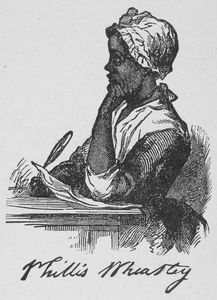A MIND OF ONE’S OWN
Virginia Woolf’s collection of essays, “A Room of One’s Own,” attempts to explain why no woman writer has lived who is comparable to Shakespeare. Her explanation is that throughout history women have been under educated and dependent upon men for their economic security; therefore, they have lacked the means and space in which to create.
Years later, Alice Walker, Pulitzer Prize winner for her novel, “The Color Purple,” took Woolf to task. She pointed out that Phillis Wheatley, an African American slave, who not only lacked money and a room of her own but didn’t even own herself, managed to create of body of poetry so widely praised that she was eventually emancipated.

(courtesy: New York City Library)
Both authors are right, of course. Women’s history has shown us the many faces of thwarted opportunity and deprivation. But where there is talent, it often finds the means to express itself, room or no room. Either way, the question remains, why have we not seen a female Shakespeare?
I have a kernel of an idea and it begins with the structural differences between men and women’s brains, of which there are several. Without cataloging them, I merely suggest that women process what they see, touch and feel differently from men, which means they experience an alternate reality. Isn’t that why men are from Mars and women from Venus? For centuries, females have lived like strangers in a strange land — a world of masculine construction right down to medical research and treatment. If history were based on matriarchal notions, what would schools teach our children, for example? What would they learn to value? Would the notion of beauty remain the same?
I am inclined to think there are many Shakespearias among us. We just haven’t seen them yet.